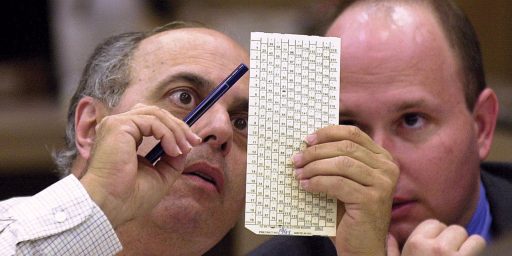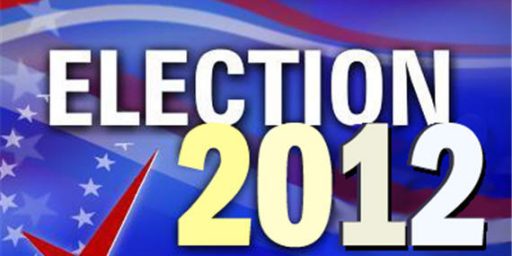Gore: American Democracy in Danger
Former Vice President Al Gore gave a speech this morning saying that “American democracy is in grave danger.” As best I can tell, he’s blaming this on television.
Text of Gore Speech at Media Conference (AP)
I came here today because I believe that American democracy is in grave danger. It is no longer possible to ignore the strangeness of our public discourse . I know that I am not the only one who feels that something has gone basically and badly wrong in the way America’s fabled “marketplace of ideas” now functions.
How many of you, I wonder, have heard a friend or a family member in the last few years remark that it’s almost as if America has entered “an alternate universe”?
I thought maybe it was an aberration when three-quarters of Americans said they believed that Saddam Hussein was responsible for attacking us on September 11, 2001. But more than four years later, between a third and a half still believe Saddam was personally responsible for planning and supporting the attack. At first I thought the exhaustive, non-stop coverage of the O.J. trial was just an unfortunate excess that marked an unwelcome departure from the normal good sense and judgment of our television news media. But now we know that it was merely an early example of a new pattern of serial obsessions that periodically take over the airwaves for weeks at a time.
[…]
In fact there was a time when America’s public discourse was consistently much more vivid, focused and clear. Our Founders, probably the most literate generation in all of history, used words with astonishing precision and believed in the Rule of Reason. Their faith in the viability of Representative Democracy rested on their trust in the wisdom of a well-informed citizenry. But they placed particular emphasis on insuring that the public could be well- informed. And they took great care to protect the openness of the marketplace of ideas in order to ensure the free-flow of knowledge.
The values that Americans had brought from Europe to the New World had grown out of the sudden explosion of literacy and knowledge after Gutenberg’s disruptive invention broke up the stagnant medieval information monopoly and triggered the Reformation, Humanism, and the Enlightenment and enshrined a new sovereign: the “Rule of Reason.”
[…]
Their world was dominated by the printed word. Just as the proverbial fish doesn’t know it lives in water, the United States in its first half century knew nothing but the world of print: the Bible, Thomas Paine’s fiery call to revolution, the Declaration of Independence, our Constitution , our laws, the Congressional Record, newspapers and books. Though they feared that a government might try to censor the printing press – as King George had done – they could not imagine that America’s public discourse would ever consist mainly of something other than words in print.
And yet, as we meet here this morning, more than 40 years have passed since the majority of Americans received their news and information from the printed word. Newspapers are hemorrhaging readers and, for the most part, resisting the temptation to inflate their circulation numbers. Reading itself is in sharp decline, not only in our country but in most of the world. The Republic of Letters has been invaded and occupied by television.
Radio, the internet, movies, telephones, and other media all now vie for our attention – but it is television that still completely dominates the flow of information in modern America. In fact, according to an authoritative global study, Americans now watch television an average of four hours and 28 minutes every day — 90 minutes more than the world average.
When you assume eight hours of work a day, six to eight hours of sleep and a couple of hours to bathe, dress, eat and commute, that is almost three-quarters of all the discretionary time that the average American has. And for younger Americans, the average is even higher.
[…]
Consider the rules by which our present “public forum” now operates, and how different they are from the forum our Founders knew. Instead of the easy and free access individuals had to participate in the national conversation by means of the printed word, the world of television makes it virtually impossible for individuals to take part in what passes for a national conversation today.
Inexpensive metal printing presses were almost everywhere in America. They were easily accessible and operated by printers eager to typeset essays, pamphlets, books or flyers. Television stations and networks, by contrast, are almost completely inaccessible to individual citizens and almost always uninterested in ideas contributed by individual citizens.
Ironically, television programming is actually more accessible to more people than any source of information has ever been in all of history. But here is the crucial distinction: it is accessible in only one direction; there is no true interactivity, and certainly no conversation.
While almost all of what Gore says is true, his premise is wrong to the point of absurdity. When exactly was this golden era in which ordinary citizens had substantial amounts of free time in which to engage in a national two-way dialogue on politics? It never existed.
It’s certainly true that we are live stressful lives because of the expectation that most people maintain 24/7 contact with the office. It’s true that we’re spending more time commuting to and from work. And, of course, the norm in most families is for the husband and wife to both have full-time jobs. Still, we have substantially more leisure time than our forebearers; certainly more than those who lived in the colonial era and early days of the Republic.
The ability to get access to information and comprehend it has certainly never been greater. Even the president of the United States had no way to communicate with the citizens on an immediate basis prior to the advent of radio. Almost every American can read, something that was not true of the founding generation.
As to the ability of ordinary citizens to get heard on a national stage, it is infinitely easier now than it was twenty years ago, let alone two hundred. How was a shopkeeper in Philadelphia to get his message out to the masses of Charleston in the 1770s? It was virtually impossible, in fact, unless one owned a newspaper. Nowadays, anyone can set up a free website on Blogspot or several other services and commence typing. Some get thousands of visitors a day. That was simply impossible for even the rich and powerful generations ago.





Sounds like gore is a proponent of medium theory, following the lines of McLuhan, Joshua Myerowitz and Neil Postman. Also known as a luddite.
When you assume eight hours of work a day, six to eight hours of sleep and a couple of hours to bathe, dress, eat and commute, that is almost three-quarters of all the discretionary time that the average American has. And for younger Americans, the average is even higher.
Compared to the working days of previous generations – like the founders – who worked sunrise to sun-up, had shorter lifespans and no indoor plumbing or air conditioning, just to name a few things.
Al is almost sounding like the unabomber.
“..and don’t forget I invented the internet…”
Talk about an alternate universe. Sheesh.
Our Founders, probably the most literate generation in all of history
You have to hand it to Al, he used some pretty minimal awareness of the world around him to achieve a pretty high position.
Al Gore: Peter principle personified.
The most import quote of the speech was
“For these and other reasons, The US Press was recently found in a comprehensive international study to be only the 27th freest press in the world.”
If true, then our Republic is in grave danger.
Yep, that was Albert Gore; obtuse, effete, and wrong again!
He tries to combat his intellectual failings with volume and verbosity, but all it does is help to bring attention to how wrong he is, AGAIN!
Actually, in the 1770s, one could hire a printer, print a pamphlet, send it out. Still took some money, but a lot of people could get a lot of things out (e.g., Dickinson’s _Letters from a Pennsylvania Farmer_ or Tom Paine’s _Common Sense_). There are a couple of really good studies of Revolutionary pamphlet literature.
These days, blogs serve the same function, only with a rather increased turn-around time.
Oh, and the era of civility? The only reason we believe that _ever_ existed is that all the scurrilious slime that got printed was never reprinted; we read the best example of the Founders’ prose, their most successful arguments, their greatest pieces, and we assume that everything was like that. Not so, by a very long shot.
If Gore had been elected, Our Democracy would have been a think of the past by now.
Gore just couldn’t reist saying:
‘Everything went to hell when the usurper Chimpy McBushHitlerKatrinaburtonAbuGitmo was selected in 2000.’
Herb, do you really believe this stuff? Do you have a program that generates it?
We wouldn’t be a democracy any more if Gore had been elected???
My goodness.
Anderson, the answer is YES. Gore would have been just like his buddy Clinton. Gore would have given te store away to satisfy his perveted ego.
You should read Drudge today and see what L. Freeh said about Clinton. And don’t forget, Gore was right in there with Clinton and was just as bad if not worse.
And I shudder to think what would have happened if 9/11 happened on a Gore watch. Makes me crindge.
Herb – Your spelling may suck, but you’re right on target about Gore. Albert is all about vapid, egotistical ravings that bring attention to himself but offer no new ideas or rarely even cogent sentences. He’d still be prattling along in the middle of his concession speech if they had forgotten to turn the camera lights off.
Thank you dougrc. And sorry about the spelling,
I get a little impatient with those Liberals that just can’t get over it.
If anyone should know about the dangers of television to our society, it would be Al Gore. Have you seen his Current TV network? He should look in the mirror.
It’s hard to underestimate the appeal of saying ‘People are too stupid to run a democracy because they didn’t vote for me’.